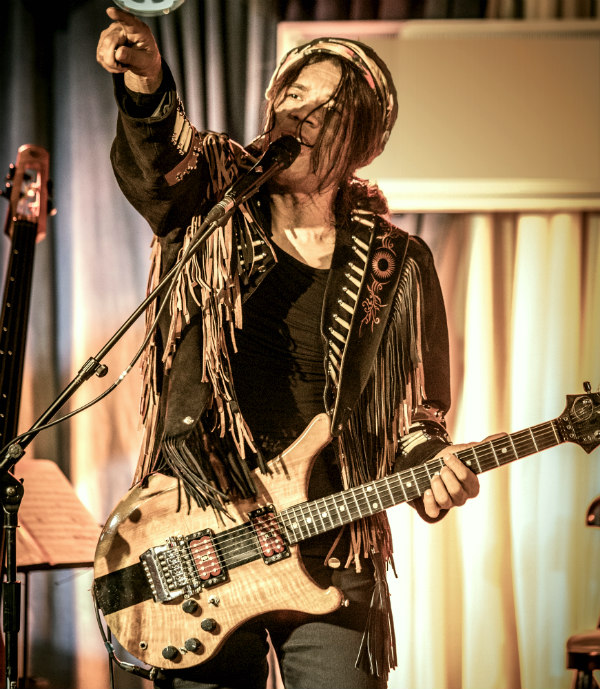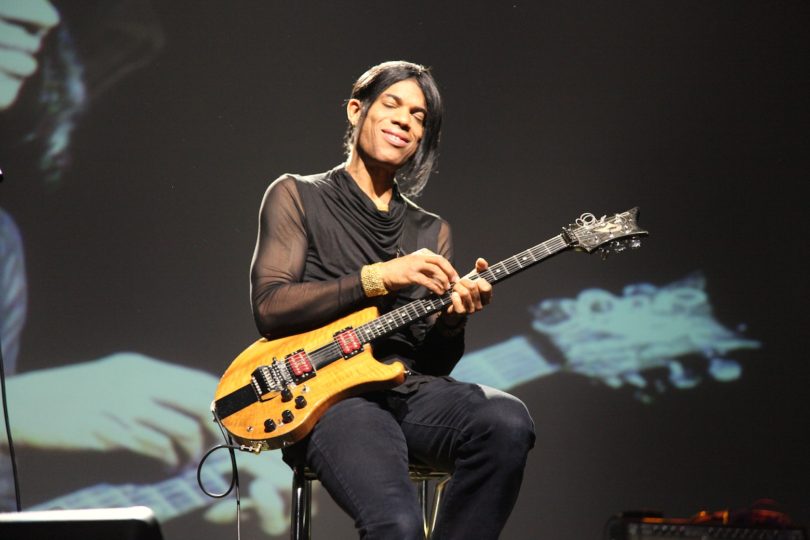I got a chance to sit down and chat with world-renowned guitarist, Stanley Jordan ahead of his show at The Mint this weekend on Saturday, February 1. The show, Stanley Plays Jimi, is a new concept that showcases Stanley performing as Jimi Hendrix in full costume. He’ll be supported by the Stanley Jordan band, a trio featuring Stanley on guitar; Thierry Arpino on drums, and Gary Kelly on bass.
Stanley’s 1985 album Magic Touch scored the number #1 spot on Billboard’s Jazz chart for 51 weeks. Stanley has shared the stage/recorded with jazz artists such as Benny Carter, Dizzy Gillespie, Miles Davis and Billy Cobham. “I played rock and blues before I played jazz. In fact, Jimi’s constant searching for new sounds inspired me to move toward jazz in the first place,” explains Stanley.
Over the course of our conversation, I felt the magnetism of Stanley’s passion. He’s a man who has studied and perfected his instrument. He looked in his youth to Hendrix as a teacher. All these years later, the inspiration still buzzes like electricity in his fingers. I took the opportunity to explore Stanley’s enduring love for his childhood idol and find out why he’s using his platform and success in jazz to celebrate the rock genius of the late Jimi Hendrix.

Stanley Jordan plays Jimi Hendrix
John Flanagan: Welcome back to Los Angeles and congratulations on your upcoming show,Stanley Plays Jimi, A Jimi Hendrix Tribute. There’s a certain legacy with icons that touches our hearts, not just their artistry, but the interesting way we react when an artist is taken too soon. It’s as though their story was unfinished. There’s this urge, I think, as musicians to kind of finish the story or continue that legacy. Is that kind of how you felt when you when you decide to go back to your roots, go back to this artist you love so much and create this show?
Stanley Jordan: Yes, exactly. There’s a desire not only to continue their art, but also to try to continue their life. Obviously, you can’t technically do that, but the part of them that lives on in us. There’s a desire to keep that alive.
JF: You’re releasing a new album this year. What can you tell us to expect from Feather In The Wind?
SJ: Oh, yes. Feather in The Wind is finished, though we’re still working out when the release date will be. It’s a series of reflections on change and loss and redemption and renewal. It came out of experiences that I had while I was making the album. It sort of got woven into themes of the album itself.
JF: It’s been nine years since your last solo record. Did it take you those nine years to write this one or what was the writing and recording process like?
SJ: The last record I did just under my name was Friends, which was a released in 2011. Since then I did Duets with Kevin Eubanks. That was 2015, so it hasn’t been quite nine years. This record, Feather In The Wind, it’s been done for a for a couple of years now. I was with Mack Avenue Records and I’m no longer with that label. This is my last record for Mack Avenue. I’m not as directly in touch with the label as I used to be. That’s why it’s hard for me to say when it will be released. But in the meantime, I’ve been working on some other projects. I’ve got another album that’s almost finished which is made completely in Brazil with Brazilian artists. And I go there a lot every time I’m there, I recorded a little bit more of it. I’m really excited about that because I’ve had a longstanding relationship with Brazil. I feel like I’ve been adopted as an honorary Brazilian. I just have so much love for the people and the culture and the music, so I decided to give something back. So this album is intended for a Brazilian audience. Okay, I’ll share it with the rest of the world.
JF: I think people be mad at you if you didn’t. I have a few more questions for you about the Jimi Hendrix show. You’re playing at The Mint, correct?
SJ: That’s right.
JF: One of my favorite venues here in Los Angeles! You say that you want to play a show that would be what Jimi Hendrix would be playing today. What does that mean to you?
SJ: Yes. I’m glad you mentioned this because we’re starting to talk a little bit about my history and my connection with Jimi Hendrix. Some people might be a little bit surprised because they know me more as a jazz musician. And Hendrix, of course, Jimi Hendrix was known more in rock, but actually Jimi Hendrix is one of the inspirations for me to move toward jazz. I felt that he was starting to do that in his music. He was searching and seeking and exploring.
JF: There are so many examples of people who have made massive careers for themselves in emulating the musicians that they respect and love so much. I mean, Leann Rimes got her start by imitating Patsy Cline. So many artists over the years have made careers for themselves through tribute. On the other hand, you come from a well-established career as a jazz artist. You’ve worked with incredible jazz legends. You have four Grammy nominations and huge success on the Billboard jazz charts. So what made you want to do this tribute show?
SJ: Talking about LeAnn Rimes and Patsy Cline. It’s common for young musicians to emulate their favorite artists, and that’s part of their growth. I certainly went through that. But the takeaway I got from Jimi Hendrix was that you have to find your own style and you have to find your own direction in music. I really feel that I did that. I went on to do things that were kind of my own take on music. And again, it’s Jimi who inspired that idea, even though I didn’t imitate him specifically. So now I’m revisiting his legacy in another way because we’ve had some historical landmarks. We had the 50th anniversary of theWoodstock performance. Some things kind of got me thinking this would be a great time to do a more full tribute.
And I got the idea to do it this way because I feel that there’s so much that people don’t understand. I still run into people sometimes, for example, who think Jimmy died of a heroin overdose. You know, there’s a lot of misunderstandings about him and about his life and sort of the world around him. I was so impressed not just by his music, but by him. I just thought he was a brilliant human being, so creative and so inspirational. The way that he saw things in such a unique way and the way that everything was so spiritual. Everything he approached was from a spiritual perspective, so I wanted to kind of highlight Jimmy the person.
So I got the idea to approach the show as an actor as well as a musician. When I go on stage, I dress the part, I look the part. Some people have a performance-art piece, like a one-woman show. You know, there’s an element of that in my show where I try to embody this person who is so inspirational to me. But I also try to take it another step further and say, well, what would he be doing today? Of course, there’s no way that any of us can know for sure, so there’s room for creativity. But as somebody who’s been so intimately into his music for so long, I do feel sort of qualified to make to take a stand on that and say this is my fantasy Jimi Hendrix concert if he was still playing today. And it’s not random, but it’s based on really having an intimate connection with music since I was very young.
JF: Now, that leads me to my last question for you. Hearing your approach and philosophy on this is completely fascinating. The songs are, of course, a tribute to the man. But as a jazz artist yourself, your riff on those songs is a tribute to his spirit. How much artistic license do you permit yourself in that philosophy, and do you really even know before you’re on stage?
SJ: Yeah, I think so. I do take artistic license with it because one thing we know is Jimi wouldn’t be doing the music the way he did before. I don’t play any of this stuff note for note, so it’s a little bit unique because I think the people who try to dress and look like Jimi portray the character. Generally, they do try to also play his music pretty much note for note. I don’t do that. So I do try to sort of suggest where I would have liked to see him go with it. And of course, it’s viewed through my filter. I do like my own two-hand touch technique, for example. I use it because that’s part of my toolset as a musician. But having said that, Jimi was an inspiration for me to develop that technique in the first place. I saw him do some stuff when he was playing with his left hand and I said, that’s interesting. I wonder if you could do that with your right hand to doing different parts. So even then, even there, I mean, that that connection to Jimi is going all the way back too.
JF: It seems like you’re so grateful for the way that he influenced you, that you’re kind of kind of giving it back to the man and to the legacy. It’s a really cool way to pay tribute to somebody who inspired and made you who you were, who you are. Is there anything else you want to say to your audiences before your upcoming show here at the Mint? Can anybody look forward to lighting your guitar on fire?
SJ: No, I’m not going to let my guitar and fire me that I’m portraying today. Who would be 77 or something like that? He doesn’t destroy his instrument. He takes good care of his hearing so he doesn’t play at the volume that he used to. So there’s not going to be a giant Marshall stack behind me. And at the same time, you have the people who say, well, he didn’t do as much showmanship in the last year of his life. So maybe he was moving away from that. Well, I think that the bottom line on that is that he did what he felt like doing. And so if he felt like doing it less than she did at last. Right. I don’t feel that I can’t do that stuff. I mean, Jimmy comes from a long tradition of performers with a showman element. You know, it comes from him, from our team and from total cast. You know, even Dizzy Gillespie did a lot of crazy stuff on stage. I mean, this is also part of the tradition. So I’m still keeping that tradition alive through my version of Jimmy today.
JF: Well, it sounds like you certainly are. I think that people can look forward to this show. And I certainly am grateful that you took the time to speak with me today.
SJ: Okay, thank you. I enjoyed talking with you.








